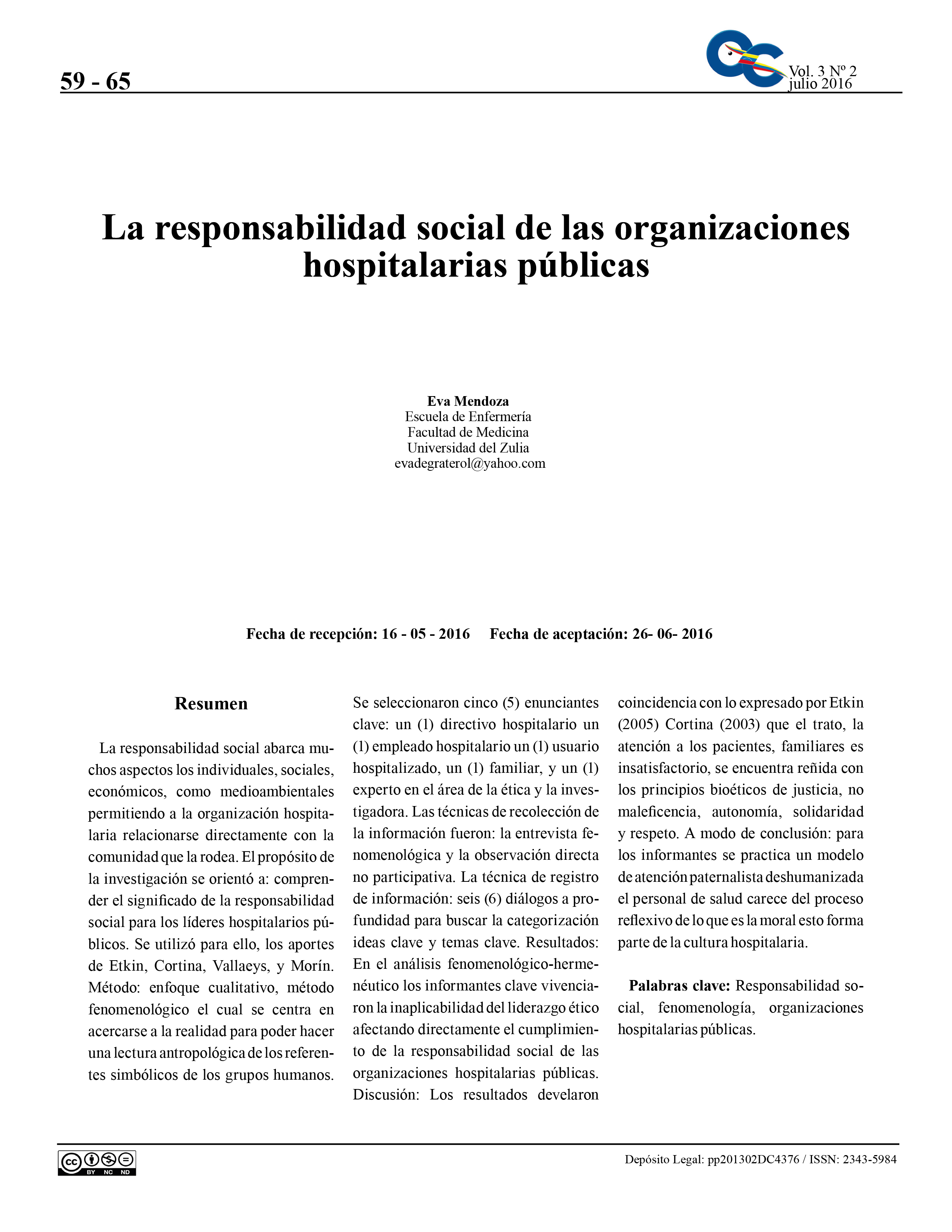The social responsibility of public hospital organization
Keywords:
Social responsibility, phenomenology, public hospital organizationsAbstract
Social responsibility encompasses many aspects, individual, social, economic, as well as environmental, allowing the hospital organization to relate directly to the surrounding community. The purpose of the research was to: understand the meaning of social responsibility for public hospital leaders. The contributions of Etkin, Cortina, Vallaeys, and Morín were used for this purpose. Method: qualitative approach, phenomenological method which focuses on approaching reality in order to make an anthropological reading of the symbolic references of human groups. Five (5) key statements were selected: one (1) hospital manager, one (1) hospital employee, one (1) hospital user, one (1) family member, and one (1) expert in the area of ethics and the researcher. The techniques used to collect the information were: phenomenological interview and direct non-participatory observation. Information recording technique: six (6) in-depth dialogues to seek categorization of key ideas and key issues. Results: In the phenomenological-hermeneutical analysis, key informants experienced the inapplicability of ethical leadership, directly affecting the fulfillment of social responsibility of public hospital organizations. Discussion: The results revealed agreement with what was expressed by Etkin (2005) Cortina (2003) that the treatment, care of patients and their families is unsatisfactory and is at odds with the bioethical principles of justice, nonmaleficence, autonomy, solidarity and respect. By way of conclusion: for the informants a model of dehumanized paternalistic attention is practiced, the health personnel lacks the reflective process of what morality is, this is part of the hospital culture.
Downloads
References
Camps, V. (2005). La Voluntad de Vivir. España: Editorial Ariel. Guédez, V. (2006). Ética y práctica de la responsabilidad social empresarial. Venezuela: Editorial Planeta.
Heidegger, M. (1983). El ser y el tiempo. México: Fondo de Cultura Económica.
Klebe, Treviño, L. y Brown M. E. (2005). La dirección ética o como derribar cinco mitos éticos empresariales. Revista de empresa. N° 11
López, L, de Armas, A, Porto, M. (2007). Por una nueva ética. La Habana: Editorial Félix Varela.
Lussier, R, Achua, Ch F. (2005). Liderazgo. Teoría, aplicación, desarrollo de habilidades. Internacional, México: Thomson Editores S.A.
Málaga, H. (2005). Salud pública. Enfoque bioético. Caracas: Editorial Disinlimed C.A.
Martínez, M. (2007). La investigación cualitativa etnográfica en educación. México: Trillas.
Martínez, M. (2002) Comportamiento Humano. Nuevos métodos de investigación. México: Trillas.
Paz, Sandín, M. (2003). Investigación cualitativa en educación. Madrid: Mc Graw Hill.
Vallaeys, F. (2003). La responsabilidad social de las organizaciones. Pontifica Universidad Católica del Perú. Disponible en http:// www.construyepais.cl/ (Consulta 23de julio 2007)

Downloads
Published
How to Cite
Issue
Section
License

This work is licensed under a Creative Commons Attribution-NoDerivatives 4.0 International License.







